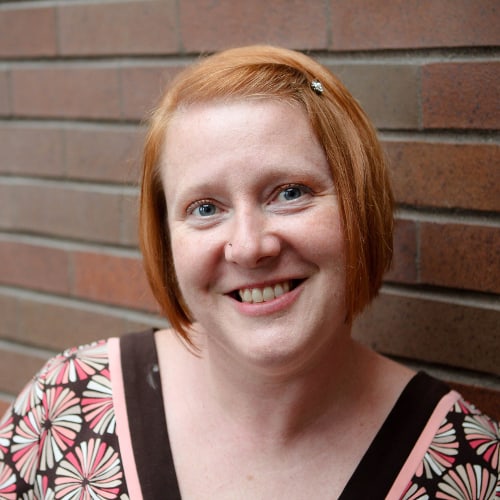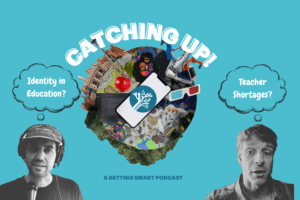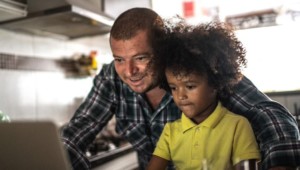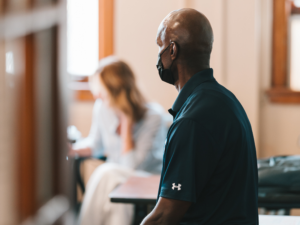For the Parents, When You Know What You Don’t Know

Smart Parents authors Tom Vander Ark and Carri Schneider were at the iNACOL Symposium for Smart Parents Want Student-Centered Learning. After the session, Tom and Carri signed books and talked with educators. Check out, Photoblog | iNACOL Symposium 2015 for pictures.
Amber Chandler
There’s a funny story my husband and I tell about our complete ineptitude when we first brought our daughter Zoey, now 10, home from the hospital. We took shifts of staying awake and holding her because we thought she was going to roll over and get caught in her blankets. Jokingly, we recall who won American Idol that year (Carrie Underwood), and reminisce about watching all three Back to the Future movies in a weekend, something I don’t recommend. Now, if you don’t have kids yet, you might be thinking, “Ok. Overprotective, but that’s understandable.”
However, if you have kids, you’re probably laughing at the idea of a baby being able to roll over in her first week of life, when in all actuality, it takes babies at least four months, and sometimes up to six months to get that trick down. No, we didn’t think our baby was an overachiever. We just didn’t know. And, that’s the thing with parenting, knowing what you don’t know is half the battle.
Smart Parents: Parenting for Powerful Learning, is the collaborative effort of Bonnie Lathram, Carri Schneider, and Tom Vander Ark. It is the educational manual for parents who have recognized that they “don’t know what they don’t know” when it comes to learning in the 21st century. With more than 60 parents and learning experts offering tips and experience, this is an engaging and informative read.
I’ve been a mom for ten years and a teacher for nearly double that, and just like those moments when I didn’t understand that my daughter couldn’t roll over, there were many “ah ha” moments as I explored this book–some that hit home as a parent, and others that the teacher in me mentally bookmarked.
From the parent perspective, Mary Ryerse’s “What are some tips for making mealtimes matter” offered ideas that we haven’t implemented yet in our dinner time routine, which incidentally isn’t a very organized routine. Ryerse encourages parents that dinner time doesn’t have to be perfect, just intentional. I love her suggestion to pose moral dilemmas and discuss with your children how they might respond; my daughter heads to middle school next year, and I can already think of a few issues that I’d love to rehearse with her.
Another aspect of the book that I enjoyed is the down-to-earth tone. Case in point, Antonia Slagle’s “Ready for the World: Redefining Success in the Age of Change” sounds all too familiar: “At an early age, my son demonstrated the qualities of someone who was either going to rule the world or die trying.” My first thought was that I should set up a playdate with my seven year old son Oliver.
From the teacher perspective, Sarah Vander Schaaff’s “Never First to Finish: Why Pace Matters” was eye-opening. Though the piece was about automaticity with math, I can easily transfer what I learned here into timed-writing instruction. I like that she recognized the need for the fast pace, but also how she balanced that with the reality in front of her: her daughter will never be first, but that doesn’t matter, as long as she is performing at her own optimal best. I have a procedure in my classroom regarding tests or quizzes–when you complete it, you put it in the folder on your desk and then read, so as to work at your own best pace, not a peers. This means no getting up to hand in your paper, no passing papers, or anything else that announces your completion. However, it hadn’t occurred to me that I should focus on individual student times. I’m going to add a start and stop time to the top of assessments and ask students to set goals for their best pace.
This book is an excellent resource for parents and teachers who are seeking direction, looking for educationally sound tips and stories that will help unveil the great unknown: what do I need to know that I don’t know right now to best help children? Topics range from mentoring, to student-centered learning, to core values to digital citizenship. Just like my husband and I didn’t even understand the situation we were facing when we were getting my daughter to sleep, I feel like this book opened my eyes to several other topics that I hadn’t thought about–and believe me, I think about education and my own children more than everything else combined.
Ask most parents, and somewhere, perhaps now cast aside, is a dog-earred copy of What to Expect When You’re Expecting, the bible for newbie parents. It was within those pages that I learned about the developmental milestones I should be looking for, and where I learned that rolling over wasn’t even a possibility.
I suggest that Smart Parents: Parenting for Powerful Learning is the educational equivalent, offering both insights and affirmations, exactly what most of us need on the long journey from cradle to graduation. Though it is always easy to laugh at our foibles in retrospect, being a parent is no easy task and at one point or another, most of us have wished for a manual. Though we all have to experience parenthood on our own terms, it is encouraging to find a book that is so well-conceived and large-hearted, engaging and humbling at the same time, where the voices are real, the advice authentic, and the situations familiar.
This blog is part of our Smart Parents blog series and book, Smart Parents: Parenting for Powerful Learning in partnership with The Nellie Mae Education Foundation. For more information, please see our Smart Parents: Parenting for Powerful Learning page, and:








Gary Gruber
Quick story re dinner conversation with our three young children (years ago as they are now 52,51 and 47). We often took stories from the news and talked about them with the kids. One had to do with a driver of a car (remember these kids were like 10, 8 and 4 at the time and not yet driving) and said driver swerved to miss an animal on the road and ran head-on into another car, killing at least one person. We asked how that might have been different? The discussion was animated and we moved on to another story. Years later, our 18 year old son was driving back to college with friends in the car and yep, you got it. A dog ran out in front of him. A car was coming toward him and he said that story flashed back into his mind and he ran over the dog and killed it rather than trying to stop which seemed impossible of risking a much more serious accident. Although he stopped the car and threw up, he found the owner of the dog and and explained what happened. You just never know how those dinner time stories might be used later on. Keep telling stories with your kids!